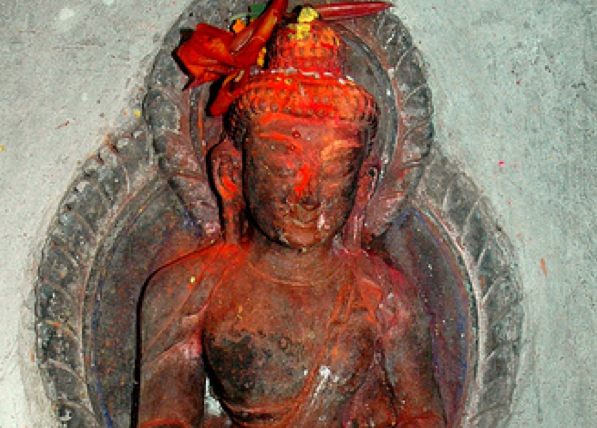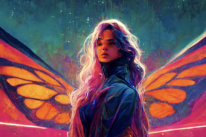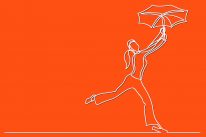“Sometimes questions are more important than answers.” -Nancy Willard
A friend of mine once told me she frequently asked herself, “When is the other shoe going to drop?”
Whenever things were going well for her, she braced herself for an impending fall so that it wouldn’t be too devastating when things changed, as they often do.
Despite her intentions, this didn’t protect her from pain; it just kept her from fully enjoying what might have been some of the most fulfilling experiences of her life.
I realized then that I was also living my life around fearful, defeatist questions.
What if I never find love? What if I don’t have what it takes? What if I messed up my one big chance?
They always danced around fears of uncertainty and inadequacy—and because they frequently dominated my thoughts, I consistently acted from a tense, frightened place. These questions felt like self-preservation, when really they were emotional self-mutilation.
And they repeatedly instigated a self-fulfilling prophecy. When you frequently look for answers to questions about worst case scenarios, you tend to find them, real or imagined.
It reminds of this time I read about a woman who feared for years that she had cancer, even though she had no symptoms and doctors saw no medical proof to corroborate her suspicions. Many years later, when she received a cancer diagnosis, she said she almost felt relief because she finally knew she was right.
She attached to her panic over the potential for sickness, and in doing so began suffering long before there was a physical cause.
We can’t change that some things might not last, and things might happen that we wouldn’t have chosen. But the reality is there are just as many positive possibilities as there are negative ones.
We get to choose where we focus our energy—whether we dwell on everything that might go wrong, or imagine everything that could go right. What we think dictates what we’ll do, and that plays a big role in what we create.
It all starts with asking ourselves the right questions. What are those? I don’t know—I don’t have all the answers. But I can tell you mine:
What if I let myself enjoy this moment? How can I appreciate myself and other people in action today? What’s good around me, and how can I contribute to it?
Photo by Wonderlane
About Lori Deschene
Lori Deschene is the founder of Tiny Buddha. She started the site after struggling with depression, bulimia, c-PTSD, and toxic shame so she could recycle her former pain into something useful and inspire others to do the same. You can find her books, including Tiny Buddha’s Gratitude Journal and Tiny Buddha’s Worry Journal, here and learn more about her eCourse, Recreate Your Life Story, if you’re ready to transform your life and become the person you want to be.
- Web |
- More Posts














 Though I run this site, it is not mine. It's ours. It's not about me. It's about us. Your stories and your wisdom are just as meaningful as mine.
Though I run this site, it is not mine. It's ours. It's not about me. It's about us. Your stories and your wisdom are just as meaningful as mine.
I once read the following idea that has stuck with me ever since, “A positive outcome is just as likely as a negative outcome.”
I used to try to plan for every possible outcome, often assuming the worst of the outcomes was likely to occur. Sometimes my worst fear actually happened, and other times it didn’t.
The amazing thing about my worst fears coming true was discovering that my fear was far greater than any pain that actually resulted from the outcome. This was a powerful realization for me and I decided not to plan, consider and worry over what might happen because I don’t control what happens, and I will get through whatever comes.
Framing my life around the positive instead of the negative has greatly improved my health and happiness.
Have a grateful day!
Chrysta
“The amazing thing about my worst fears coming true was discovering that
my fear was far greater than any pain that actually resulted from the
outcome.” <~ Yes I have found this too! Sometimes dread is far worse than any "bad" thing that might happen.
Absolutely beautiful, Lori…
Just today I was trying to explain exactly this to somebody who is afraid to dream because of the possible disappointment if the dream didn’t come true… If you don’t mind I’d like to send her this…as I couldn’t say it better.
Keep up your wonderful work, Lori…
Thanks so much Renate. Your friend is lucky to have you in her life!
I love your questions. One that I often ask myself is “what if everything is exactly how God intended.” Because it is and I just have to remind myself!
I know what you mean! It is definitely a comforting and liberating feeling to consider that maybe nothing is “wrong” with this moment.
Another one that’s right on the money.
Always loved the concept of keeping attention on what we want. “What’s good around me, and how can I contribute to it?” is a great question. One that Ben Franklin asked himself every day when he said “What good can I do today?” As always, you remind us of what’s important. I love this blog.
Thank you Elle. =)
“These questions felt like self-preservation when they really were emotional self-mutilation.” Very true! I’ve always thought that I am somehow keeping myself safe by expecting the worst — safe from disappointment, fear, shock, shame, etc. But as you say, not focusing on the goodness of the present moment can at the very least cause stress and panic now, and maybe even induce the “self-fullfilling prophecy.” Thank you for the reminder, Tiny Buddha!
You are most welcome! =)
Thanks Megan I need and must apply this in my life.
Hi there,
Was this comment meant for me? (I wrote this post…)
Lori
Lori, I have a cousin who continually asked the same question re: the next shoe dropping. She lived her life in a constant state of fear. It was only when she was well into her 40s that she finally woke and realized how she’d been constraining her happiness. Great post. We need to be more “conscious” overall of what we think about.
How wonderful that she eventually realized it! I find that I need to check in with my thoughts often. It’s amazing how quickly the monkey mind can take over.
This sounds like my childhood and early adulthood as my parents taught us not to enjoy the good things because something bad would always follow. This created a lack of gratitude for the wonders in life, and set us up for constant fear (similar to the fictional “bad luck always runs in 3’s” adage). Today I know that the good things are to be appreciated for what they are – albeit temporary – and then look for more goodness to come.
Yes, I’ve heard that 3’s adage as well! I love what you wrote about accepting and appreciating good things for what they are. It’s liberating to fully accept that everything comes and goes–whatever is lost will again be found.
Seeking only answers can be limiting, but asking the right questions opens us up to new possibilities.
I can really relate to this post too. Always assuming the worse with my glass half empty afraid of what can go wrong .. Instead of enjoying life. Afraid to jump because I might fall …
Another important post, Lori.
It got me to thinking about my family and how generalized fear was pressed into my thoughts from the earliest age, simply by growing up with a mom and dad who were fearful themselves. Their attitude was oh-so-subtle, almost unstated, but the vibe never left the house and the message was clear: You cannot trust the future. They didn’t. So I didn’t.
By my mid twenties I finally figured out I had been psychologically poisoned. But by that time I was addicted to fear and worrying. I use the term “addicted” because I truly was. I knew that negative thinking was destructive but I couldn’t break the thought-pattern habits, even with years of spiritual study and practice. I could not find FAITH.
Then…one day…I met a shaman. I allow her light to enter me…and finally, I broke through my psychic prison. The weight of constant apprehension was lifted. Living became easier with room for fun and play. And I then connected with my mother on deep levels I never would have expected. And now I am helping her break free as well.
I wish I could say that about Dad. He is deep into senility now and the only way I can reach him is through forgiveness and acceptance for who he is. I don’t respect him. But I can love him for the person he wanted to be beyond the fog of fear. He never found his way to peace. But if I can feel peaceful in his presence, I will have become a better man myself.
In two weeks I will visit my parents for ten days. My father is very difficult to be around. He is demanding and rude. If I can maintain the patience of a saint, I will become one.
Dad is my lesson.
Irv
Hi Irv,
I could relate to what you wrote in a big way. My childhood instilled a lot of fear in me as well, because I grew in an environment where I always to had to be on guard–always cautious not to do anything wrong. The hardest thing was that the rules kept changing–something that was okay one day was not okay the next, and the consequences were always painful and emotionally damaging. There are so many things from my past I’ve dealt with many times over, and yet there are always new layers to peel back–new lessons to be learned.
I love what you wrote about loving your father for the person he wanted to be. This is something that helps me with some relationships that were formerly strained. I do my best to live by the old adage, “Treat people as you want to be treated.”
Much love,
Lori
Wow this is me all over i always wait for the bad thing to happen if something good does ugh! X
I read this with my heart, it seems that is exactly me, now I am in my Vacation, but my thought and my Question is
“When is the other shoe going to drop?” when I am back to work. this never helps me to avoid hurt and pain. From my own life experience, moving around this world, especially, in mid of 50s, I kind of also keep telling myself this: there is land hold if sky collapse….. it is hard to stop thinking or asking this kind of question—when is the other shoe going to drop?
thanks
You’re most welcome. =)
Beautiful!!! The choice I make to read TinyBuddha every day has truly brightened my life 😀 Lately some things have not been going the way I had wished for. I’ve been reading a book called Zen and the Art of Happiness by Chris Prentiss. Something he said in there is something I’ve had to remind myself of many times in the past week. EVERYTHING THAT HAPPENS IS THE MOST PERFECT THING THAT COULD HAPPEN.The right question I need to ask myself is: How will I allow these difficult situations to transform me and let me grow into more of the human being I wish to be?Thanks Lori for your post!Love,Sarah